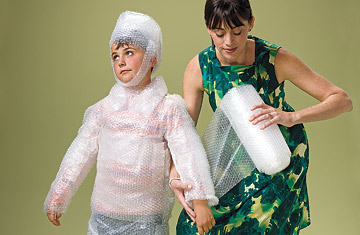
(4 of 8)
That advice may seem perfectly sensible to parents bombarded by heartbreaking news stories about missing little girls and the predator next door. But too many parents, says Skenazy, have the math all wrong. Refusing to vaccinate your children, as millions now threaten to do in the case of the swine flu, is statistically reckless; on the other hand, there are no reports of a child ever being poisoned by a stranger handing out tainted Halloween candy, and the odds of being kidnapped and killed by a stranger are about 1 in 1.5 million. When parents confront you with "How can you let him go to the store alone?," she suggests countering with "How can you let him visit your relatives?" (Some 80% of kids who are molested are victims of friends or relatives.) Or ride in the car with you? (More than 430,000 kids were injured in motor vehicles last year.) "I'm not saying that there is no danger in the world or that we shouldn't be prepared," she says. "But there is good and bad luck and fate and things beyond our ability to change. The way kids learn to be resourceful is by having to use their resources." Besides, she says with a smile, "a 100%-safe world is not only impossible. It's nowhere you'd want to be."
Dispatches from the Front Lines
Eleven parents are sitting in a circle in an airy, glass-walled living room in south Austin, Texas, eating organic, gluten-free, nondairy coconut ice cream. This is a Slow Family Living class, taught by perinatal psychologist Carrie Contey and Bernadette Noll. "Our whole culture," says Contey, 38, "is geared around 'Is your kid making the benchmarks?' There's this fear of 'Is my kid's head the right size?' People think there's some mythical Good Mother out there that they aren't living up to and that it's hurting their child. I just want to pull the plug on that."
The parents seem relieved to hear it. Matt, a textbook editor, reports that he and his wife quit a book club because it caused too much stress on book-club nights, and stopped fussing about how the house looks, which brings nods all around the room: let go of perfectionism in all its tyranny. Margaret, a publishing executive, tells her own near-miss story of how she stepped back from the brink of insanity. On her son's fourth birthday, she says, "I'm like 'Oh, my God, he's eligible for Suzuki!' I literally got on the phone and called 12 Suzuki teachers," she says, before realizing the nightmare she was creating for herself and her child. Shutting down your inner helicopter isn't easy. "This is not a shift in perspective that occurs overnight," Matt admits after class. "And it's not every day that I consciously sit down and ask myself hard questions about how I want family life to be slower or better."
Fear is a kind of parenting fungus: invisible, insidious, perfectly designed to decompose your peace of mind. Fear of physical danger is at least subject to rational argument; fear of failure is harder to hose down. What could be more natural than worrying that your child might be trampled by the great, scary, globally competitive world into which she will one day be launched? It is this fear that inspires parents to demand homework in preschool, produce the snazzy bilingual campaign video for the third-grader's race for class rep, continue to provide the morning wake-up call long after he's headed off to college.
